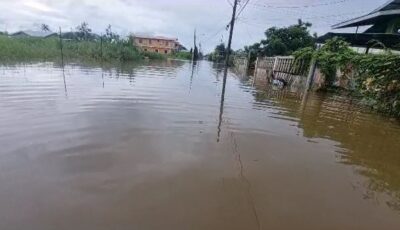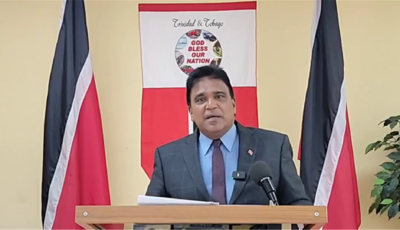HEADLINES
Commentary
Rowley strenuously objected to the construction of Penal-Debe UWI Campus
The media is reporting that the UWI Penal-Debe Campus, built during the People’s Partnership Administration continues to sit empty and has never
Posted On 30 Oct 2023
Blighted WGTL Project continues to haunt PNM
That World Gas-to-Liquids project is another of the many PNM scandals and failed projects which has cost taxpayers billions of dollars! And it is
Posted On 22 Jun 2023
Who financing Balisier House?
Ferdinand Ferreira, a founding member of the People’s National Movement (PNM), is quoted in the media as saying that the party has always
Posted On 03 Apr 2023
UNC SENATORS DEFENDED THE PARTY WELL TODAY
Today, the Opposition UNC Senators defended themselves and the Party well from the frivolous, anti-democratic motion by Senator Anthony Viera.
Posted On 22 Feb 2022
COVID WORKERS FIGHTING A WAR WITHOUT THEIR PROPER WEAPONS
We congratulate Kamla Persad-Bissessar on her success in forcing the Government to conduct an inquiry into the handling of covid. We take this
Posted On 20 Feb 2022
Letters
For fools rush in where angels fear to tread
The National Security Minister’s recent unrestrained language and conduct towards judges and unjustified criticisms of their judicial functions
Posted On 14 May 2023
Seek a fresh mandate
I recently read in one of the daily newspapers that Minister of National Security Fitzgerald Hinds said that 70% of society wants to see him
Posted On 27 Dec 2022
Don’t Blame God for Rowley’s Dotishness
Prime Minister Keith Rowley at the PNM convention on December 4, 2022, announces a National Day of Prayer. He said the country must come together
Posted On 16 Dec 2022
Keith Rowley has betrayed the sanctity of Parliament
Dear Editor, The revelation by the Commissioner of Police that the emails which Keith Rowley, then Opposition Leader read in our nations
Posted On 19 Jul 2019
T&T owes Kamla a debt of gratitude
Kamla Persad-Bissessar did what many were not expecting… she and her MPs voted unanimously with the Government to ensure passage of the Civil
Posted On 09 Apr 2019
Press Releases
Tancoo: Flooding imminent as Government fails to act
After a couple days of scattered “April showers” earlier this week, MP for Oropouche West, Dave Tancoo is again warning that severe flooding in
Posted On 06 Apr 2024
MP Khadijah Ameen wants justice for Kiss Driver’s death
Member of Parliament for St. Augustine, Ms. Khadijah Ameen is calling for justice for the death of Kiss delivery driver, Neil Ballai. Ballai was
Posted On 06 Apr 2024
UNC’s Persistent Pressure Forces Rowley Gov’t to Release 2024 EBC Report
On the heels of intense, consistent pressure from the UNC over their highly questionable refusal to lay the 2024 EBC Boundaries Report in
Posted On 06 Apr 2024
Moonilal: Hinds Fails Fire Service, Lives at Risk as Equipment Crumbles
The collapse of the Trinidad and Tobago Fire Services is another crushing indictment on the spectacularly failed Fitzgerald Hinds as Minister of
Posted On 05 Apr 2024
Padarath: Gov’t Electricity Rate Hike “Unbearable Burden”
Princes Town MP, Barry Padarath said that the contents of a report in yesterday’s Business Guardian headlined “RIC Recommends
Posted On 05 Apr 2024
Speeches
Tancoo: calls on Imbert to have a heart and indemnify the population
Today we come to you to shine some light on a very worrying development that has happened in the past few days. I am sure many of you saw or
Posted On 08 Sep 2021
Rowley’s Mad Power Grab in Tobago
My friends, we are seeing a government that is in freefall – in every single sector. Health, National Security, the business sector. And what
Posted On 16 Feb 2021
Presentation of UNC general election candidates 2020
T&T family! UNC family! It is my absolute pleasure to speak with you today, as we get ready for the sweeping victory that is to come on
Posted On 19 Jul 2020
Kamla: My vision is to build an intelligent nation
“ON THE BALLOT” UNC VIRTUAL MEETING (June 25, 2020) Introduction Good evening and thank you for joining us once again as we continue to set the
Posted On 26 Jun 2020
MNF – Kamla: There is hope
Introduction Good evening T&T! Good evening UNC family! It is good to be back! 2020 we are ready to rumble! Are you ready? Even though it’s
Posted On 11 Mar 2020
Copyright © - 2023 United National Congress







The 2016 deepwater silver lining
Kevin Ramnarine.
By Kevin Ramnarine
By the time you read this, the Prime Minister would have addressed the nation on the state of the economy. The speech would have focused on falling revenue from the energy sector and the need for understanding and adjustments in expectations.
The reality is that at the present time the world is oversupplied with oil and natural gas. Technologies such as 3D seismic and the ever increasing power of the microprocessor have greatly reduced exploration risk. In the United States, the perfection of hydraulic fracturing coupled with horizontal drilling has unlocked vast resources of oil and natural gas trapped in shale rock. America is awash with so much oil that Congress recently voted to lift the 40-year ban on exporting crude oil. Added to that, the US will soon export its first cargo of LNG from Cheniere’s Sabine Pass facility. We are living in a vastly different world.
In the wake of this glut, prices may fall even further in 2016. The average West Texas Intermediate (WTI) price in 2015 was just above $US49 a barrel. The Brent price recently hit an 11-year low. For 2016 the PIRA Energy Group has forecast an average WTI price of $US44.35 per barrel. These low oil prices have a knock-on effect on LNG prices. In addition, both ammonia and methanol prices are forecast to fall in 2016. Lower ammonia and methanol prices mean less revenue for the National Gas Company (NGC).
In this situation, there is trepidation about the future of the T&T economy. The national conversation is dominated by talk of a recession. I first heard the word recession when I was in high school in the 1980’s. Persons 30 years or younger would have no recollection of the recession of the mid to late 1980’s. Millennials are more familiar with the period of economic expansion in 1994 to 2014 which was driven by natural gas. T&T should brace itself for a rough economic ride over the next two to three years. Even so I am confident that we will rally through this period. We are fortunate to have some strong and resilient companies in our energy sector.
But there is a positive story. Falling prices aside, 2016 is a big year for the upstream sector in T&T. The last four years have been busy for upstream companies operating in the country, particularly the multinationals. This will be yet another busy year for them.
Interestingly, while drilling is being reduced all over the world due to falling prices, here in T&T we had more drilling in 2015 than in 2014. This did not happen by magic or luck. It took planning and the creation of more competitive fiscal regime. Capitalism works on incentives. If companies are incentivised and encouraged they will reciprocate with investment.
The centrepiece of the 2016 upstream programme is the commencement of a major drilling campaign in deepwater by BHP Billiton and its partners. From 2012 and 2014 the Ministry of Energy and Energy Affairs signed nine deepwater contracts. Previous attempts to attract investment to T&T’s deepwater in 2005/2006 ended in failure due to unattractive commercial terms. The main changes that led to success in 2012 to 2014 were changes to the fiscal/tax regime and production sharing contract terms. This made the acreage more attractive and the result was investment, particularly from BHP Billiton.
The deepwater campaign in T&T comes against the backdrop of deepwater success in the region in French Guiana in 2011 and more recently in Guyana. Will 2016/2017 be T&T’s turn for deepwater success? Of course, if we find oil in deepwater in 2016/2017 it will require the price to be above $US65 a barrel to make economic sense. The promise of deepwater oil and gas in T&T is huge. If the exploration is successful this will be a major economic game changer that is unprecedented in this country’s history.
Speaking at the Hyatt in October 2014, at the launch of the book From Oil to Gas and Beyond, industry veteran and energy economist Paul Tempest made a startling and profound prediction. His exact quote taken from the Business Guardian of October 2, 2014, is as follows:
“My prediction—offered without hesitation—is that the development of the Orinoco deep-water gas resources off Trinidad could double the per capita income in these islands within ten years, from the first confirmed discoveries and development, and could double again within another ten years. This would lead to prosperity on a scale unseen in the Caribbean—at least four times the present level with a production horizon of 50 years.”
I don’t like making predictions about the oil and gas business, and as a Minister of Energy I stayed away from making them.
My own prediction, however, is that the oil price will recover since, according to Daniel Yergin, the current price cannot sustain new investment and the world will need an additional seven million barrels per day by 2020. My second prediction is that we will discover hydrocarbons in commercial quantities in our deepwater in the coming years. The deepwater campaign of 2016/2017 may prove to be the silver lining on the dark clouds that are gathering.
A happy new year to all.
GUARDIAN
Share this:
Like this:
Disgraced PNM endorsers
PNM playing games with us
Commentary
Rowley strenuously objected to the construction of Penal-Debe UWI Campus
Blighted WGTL Project continues to haunt PNM
Who financing Balisier House?
UNC SENATORS DEFENDED THE PARTY WELL TODAY
COVID WORKERS FIGHTING A WAR WITHOUT THEIR PROPER WEAPONS